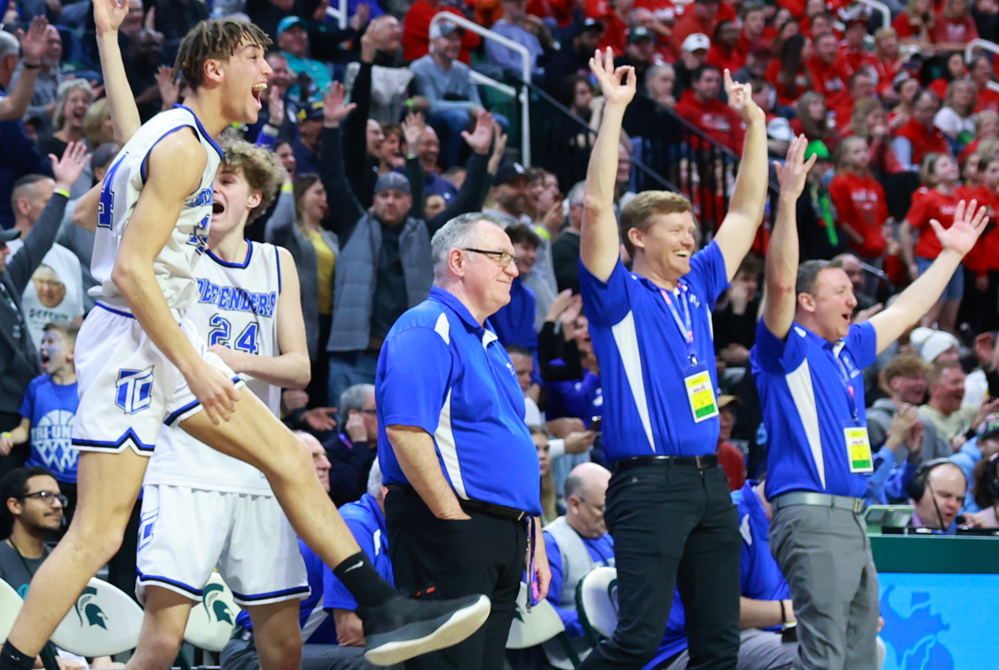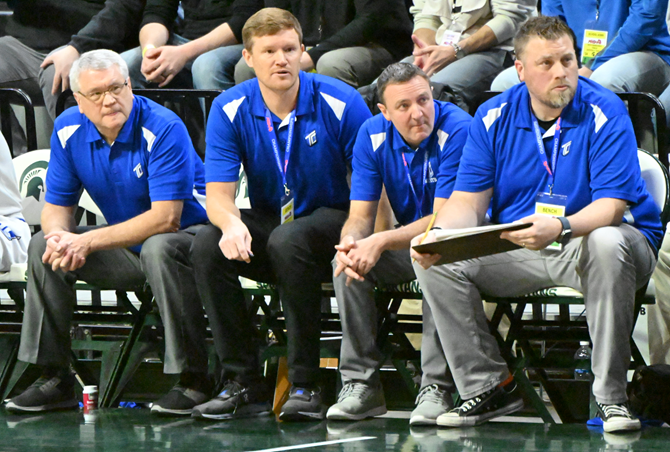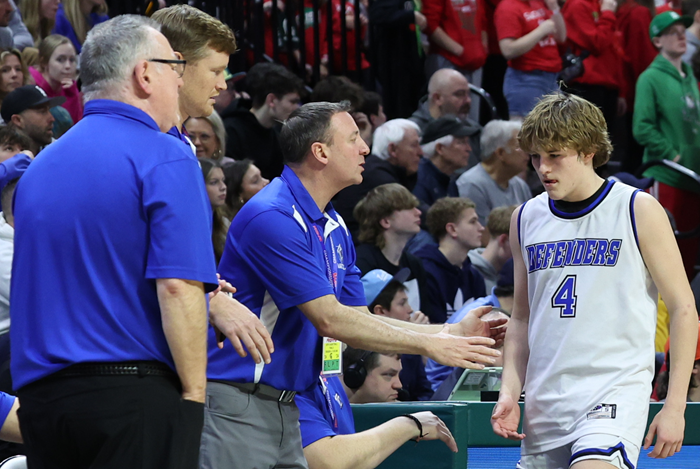
Valued Leaders Talk Sportsmanship
April 12, 2013
By Rob Kaminski
MHSAA benchmarks editor
Anyone who has attended an MHSAA sporting event has undoubtedly heard the public address announcements touting sportsmanship.
Sportsmanship is one of many lessons taught through school sports. But are today’s student-athletes the willing pupils in the subject? Or are too many kids opting for elective courses in showmanship offered via YouTube and cable networks?
While many involved in high school athletics have noticed a decline in sportsmanship, it’s not too late to inject this valuable ingredient back into our games. But efforts need to begin at the local level, and the scholastic environment needs to supplant community venues where poor sportsmanship often flourishes.
Seventeen coaches from all over the state chipped in to a benchmarks town hall discussion on sportsmanship.
East Kentwood’s Dave Emeott: “I think it is easy to see that sportsmanship is at least diminished. I think sportsmanship starts in the home, but we cannot always depend on the household to teach these lessons. As we sit in the stands, we realize that if this is where they learn it, then we need to get to work. I think we need to teach parents what a good sport looks like, as well as students. It is apparent that students will be the kind of sports they are permitted to be. Most coaches want good sportsmanship, but struggle with the balance of teaching character and winning or losing.”
Middleville Thornapple-Kellogg’s Tamara Benjamin: “Sportsmanship could be endangered. If a parent is allowed to sit in the stands and berate coaches, officials, and other athletes, it’s difficult for our students to see that this behavior is wrong because it is being tolerated. My expectations for our girls’ behavior are made clear the first day of practice. I hold them accountable for themselves, and we go forward each day.”
Holland’s Don Kimble: “I believe that it starts at home; always looking for a reason for failure opens the door to unsportsmanlike behavior. On our team, sportsmanship is stressed within the team first; if you cannot be a sportsman to your teammates, then you cannot be to others.”
Grand Haven’s Kimberly Vincent: “We’re all about sportsmanship and work with students and parents to set expectations. There are too many people pointing fingers at other people about this subject, and I think coaches have to set the example.”
Battle Creek Pennfield’s Mike Roach: “Youth sports programs need to concentrate on sportsmanship and the fact that there are winners and losers in sports. By not keeping score, the kids do not learn how to win, nor do they learn how to handle losing. Keep score. Teach kids that it is not the end of the world to lose, but be gracious in winning and losing.”
***
It could be true that much of the focus on poor sportsmanship is a result of just that: the spotlight on poor sportsmanship, rather than the good.
Thornapple-Kellogg’s Abby Kanitz: “I think that too much focus is put on the unsportsmanlike situations. There is much more good out there than bad; it just doesn't make for great stories. It does not take much more than one bad situation to ruin a game, competition or meet. I think sportsmanship comes from the coach. If your athletes know you have high expectations in this area, then their parents will know, too.”
Allegan’s Gary Ellis: “Sportsmanship is alive and well, though it is under attack. Students are exposed to so many examples of poor to horrendous sportsmanship on TV, that it seems to be the norm.”
Bloomfield Hills Andover’s David Zulkiewski: “I see positive sportsmanship every day with my athletes, and that’s because we focus on it and make it part of our daily practice and competition. Our team is much more than swimming or diving; it’s about excelling at life. So many of our kids will not compete in athletics after high school, so we try to give them skills they can use in the real world. Being a good sport is one of those skills.”
Grand Haven’s James Richardson: “Kids want and need structure, and will uphold the guidelines as long as they are clearly defined and enforced consistently. As coaches we need to build relationships with the kids and teach them proper behavior, and serve as models for them.”
Holt’s Mike Van Antwerp: “Sportsmanship is still around. If kids respect their opponents as individuals, they are good sports. Most of them would get along well if they were on the same team, so it’s important they realize that. The kids they play against are no different from them. If they respect the game, respecting their opponent follows.”
***
To be sure, no coach worth his or her clipboard sets out to allow poor sportsmanship. But emphasizing proper conduct early and often should be as essential as conducting tryouts.
Munising’s Cathy Mutter: “Sportsmanship is an important part of high school sports and life in general. I always tell my athletes, ‘You do not deserve; you earn. You have to work hard, be positive and be fair.’ I teach them to strive to be the best they can be on the team, in the classroom, at the jobs they have, and at home in their family life. Many programs struggle due to the fact they do not work together as a unit. You are only as strong as your weakest link.”
Rockford’s Ed Van Portfliet: “The O-K Conference and the member schools have done a great job of promoting sportsmanship, and I think it’s alive and well in our area. We teach our players it’s important to play hard, but they also have to respect their opponent and the game. We don’t tolerate actions or play from our players that would be considered disrespectful or detrimental to the game.”
Warren Regina’s Diane Laffey: “We always talk sportsmanship at our team meetings, our parent meetings and our coaches meetings. I guess it is an endangered species in some areas – but I do not feel it has gotten anywhere near that point at our school. I make every effort to make sure that our athletes, teams, coaches and parents keep sportsmanship at the top of our list.”
Allegan’s Ellis: “Leagues have a responsibility to educate their students about proper behavior at high school athletic events and how to treat their opponents. Schools need to develop leaders – on teams and in the stands – who set the tone at contests. The biggest trophy given out at our year-end awards night is the sportsmanship trophy.”
Marshall’s Sue Hutchings: “Sportsmanship starts with the coaching staff respecting the players and hammering the philosophy home. If one of our players exhibits bad sportsmanship, they are taken out of the competition and made to apologize. And trust me, it has happened. Our conference coaches are all pretty tight and have worked together for a number of years. We all share the same philosophy and have very, very little trouble with bad sportsmanship.”
***
Sometimes, proper sportsmanship is simply woven into the fabric of a given sport.
Grand Rapids Forest Hills Northern/Forest Hills Eastern’s Brian Telzerow: “Sportsmanship in golf is the leader in integrity. There is no other sport that is as self-policing as is golf. The young men and women must play with honor and integrity, calling penalties on themselves with no referees present. There is no entitlement here. After we play, players shake hands with all other competitors in their groups. We also make it a practice to say thanks to the host team and to the host course personnel. This is intentional to instill gratitude for the privilege of playing this sport.”
Portland’s Jim Niebling: “Sportsmanship may very well be endangered, but not in high school tennis and certainly not on our teams in Portland. Just this season my No. 1 singles player was playing his arch rival in the league championship match. They had gone back and forth for years and both knew the implication of winning the match for the upcoming Regional and Final tournaments where they were surely going to have to play again. The loser would be seeded lower and would have decidedly more difficult draws. But when the other player, up a set, began to cramp in the second set, looking like he may not be able to finish the match, my player walked to his cooler, pulled out a Gatorade and handed it to his opponent.
“My player ended up losing that match, and he knew that was a possibility when he handed his opponent that Gatorade. If that’s not sportsmanship, I don’t know what is.”
Grand Haven’s Richardson: “Sportsmanship is promoted on our team because in wrestling we are only in charge of ourselves and our actions. It’s a sport that holds individuals accountable. It is difficult in our sport to place blame on others.”
Grand Rapids Kenowa Hills/Grandville’s Brenda McDonald: “I always have my girls practice good sportsmanship. They always thank the home team or say, ‘Good job,’ to the opposing team. Many of the girls know the girls on other teams from previous gymnastics classes, so they enjoy seeing them again.”
High School Coaches Survey Identifies Parental Concerns
More than 3,000 high school coaches and athletic directors responded to a nationwide survey conducted by Growing Great Relationships (GGR) in cooperation with the National High School Coaches Association (NHSCA). The purpose of the survey was to understand what coaches and athletic directors see as their greatest needs concerning coach-parent and coach-athlete communication and relationships. GGR and NHSCA will use the results to design training and programs that address the identified needs.
The first section of the survey addressed issues surrounding parents of athletes. The first question asked coaches about their greatest concerns dealing with parents. More than 50 percent indicated over-involved parents as their No. 1 concern.
The second question asked coaches what they think parents are most concerned about. Overwhelmingly, nearly 80 percent reported the child’s amount of playing time as their perception of a parent’s biggest issue.
The next question asked coaches who are the most difficult parents. Athlete “wanna bes” were identified by 55 percent of the respondents.
Coaches then were asked what parents should do to support them. More than 70 percent indicated keeping them informed of personal difficulties their child was having at home. This was followed by 63 percent asking parents not to use social media regarding the team, or to gossip about the team or the coach’s expertise. Athletic directors’ responses were similar but with different percentages. Nearly 73 percent ranked not using social media or gossip about the team as the most important.
The second section of the survey asked coaches about their greatest concerns regarding relationships with their athletes. The first question asked coaches about the challenges they face communicating with student-athletes. Nearly 58 percent indicated an athlete receiving contradictory advice from parents and other coaches/advisers. This was followed closely with 55 percent stating an athlete’s inflated belief about his or her ability. Athletic director responses were similar but with somewhat different percentages. The greatest response, 70 percent, was the athlete receiving contradictory advice.
The second question asked the coaches for other factors interfering with their relationships with their student-athletes. The factor indicated by 58 percent of coaches was an athlete over-burdened with competing school demands (clubs, academics). For this particular question, the response from the athletic directors closely matched the coaches.
Athletic directors were asked that in their role what are their greatest concerns dealing with parents and athletes. The most frequent answer by 76 percent of athletic directors was parents bypassing coaches to complain directly to them.
In addition, nearly 500 coaches and athletic directors wrote in additional concerns that they have in their ability to communicate and work with athletes and their parents.
– Richard & Jane: Relationship Coaching

Championship Experience from Coach's Point of View Unimaginable, Unforgettable
By
Dean Holzwarth
Special for MHSAA.com
April 4, 2024
WYOMING – As the final buzzer sounded, it was all I could’ve imagined – and more.

In the weeks leading up to March 16 and the Division 4 championship game, I experienced every emotion possible as I envisioned what it would feel like to be an assistant coach on the bench at Michigan State’s Breslin Center as the Wyoming Tri-unity Christian boys basketball team achieved its ultimate goal.
In my first year as the junior varsity coach at Tri-unity, I had been on the varsity bench for a majority of the season, assisting legendary coach Mark Keeler and fellow assistants Brent Voorhees, Bob Przybysz and Mike Kaman.
I was there encouraging, motivating and supporting the varsity team. It was a role I embraced, and had become accustomed to over my almost 30 years coaching high school basketball.
I started coaching in 1995 as Jim Ringold gave me my first opportunity as the freshmen girls coach at Wyoming Kelloggsville High School. I would then coach Kelloggsville’s freshmen boys team for eight seasons, while also coaching the freshmen girls at Grandville High School. I would also coach the junior varsity teams at both schools.
I love coaching. I have a passion for it. I’ve always enjoyed getting the most out of my players while creating a bond between player and coach.
When girls basketball season moved from fall to winter joining the boys in 2007-08, I stayed at Grandville. I spent 21 seasons there before stepping down.
I still wanted to coach, and I heard that the Tri-unity junior varsity position was available. I had always respected and liked Keeler and was excited for the prospect of joining a perennial powerhouse.
I didn’t really know about Tri-unity growing up in the Wyoming Park school district. But as a young kid, I would rush home and eagerly await the afternoon delivery of the Grand Rapids Press. I would quickly find the sports page and read it from front to back, hoping one day to see my byline.
I began writing for the Press’ sports department in 1997. It was my dream job. And that’s also when I first started covering Tri-unity boys basketball.
I remember watching eventual NBA all-star Chris Kaman, along with Bryan Foltice and others play for this little Christian school and have unbridled success under Keeler.
MHSAA Tournament runs became the norm for the Defenders. They won their first Finals title in 1996, and they would claim four more over the next 26 years. They also had six runner-up finishes.
 I was sitting on media row writing for MHSAA.com in 2022 when Brady Titus led Tri-unity to its fifth state championship.
I was sitting on media row writing for MHSAA.com in 2022 when Brady Titus led Tri-unity to its fifth state championship.
I never thought that two years later I would be on the coaching staff as the Defenders pursued another one. But there I was.
I knew this year’s team had the potential to be special.
Tri-unity had returned four of its five starters from a year ago, after suffering a heart-breaking two-point loss to Munising in the Division 4 Final.
Eight seniors were on the roster. The team had a mix of talented guard play, senior leadership, size and depth. We had shooters and we played great defense, a trademark of Keeler’s teams.
This was the year, and that heaped lofty expectations on Keeler and the team. It was basically “state championship or bust.” Anything less would be considered a disappointment.
Keeler wanted it badly, and I knew the players did as well. I think they felt the pressure at times of living up to the expectations that had been set.
We had several lopsided wins, but also had a few tough losses to Division 2 and Division 3 teams – Grand Rapids Forest Hills Central, Wyoming Lee, Grandville Covenant Christian and Schoolcraft – all talented teams that I think made us better despite falling short.
As the postseason started, there was anxiety and excitement.
We were one of the favorites, but it wouldn’t be easy. We would have to earn each of the seven victories needed to win it all.
First came a District title, but then we had to play a quality Fowler team in its home gym in the Regional Semifinal. This was a game we knew would be a challenge – and it was.
We led by only one at halftime after a 7-0 run to end the second quarter. The score was tied 33-33 in the fourth quarter before senior Lincoln Eerdmans made a key 3-pointer to spark our victory.
As we went through the handshake line, several Fowler players said, “Good luck in the Finals.”
Our defense played extremely well in the Regional Final and state Quarterfinal to secure our team another trip to the Breslin.
St. Ignace was our opponent in the Semifinal, and we had to face a senior guard who could do it all – Jonny Ingalls. He lived up to the hype. He was good, and we didn’t have any answer for him in the first half. We trailed by one, only to fall behind by seven late in the third quarter.
Was this the end? Were we going to fall one game short of our goal?
 We were down by five points in the fourth quarter, but junior guard Keaton Blanker, and others, rose to the occasion. We rallied to win a tight one, and now we were one win away from a Division 4 title.
We were down by five points in the fourth quarter, but junior guard Keaton Blanker, and others, rose to the occasion. We rallied to win a tight one, and now we were one win away from a Division 4 title.
The night before the championship game, we stayed at a hotel in East Lansing as we had the first game of the day at 10 a.m. We had a team dinner, and the players seemed relaxed and eager to close out the season the way they had intended.
There was one thing that worried me. We were playing Mount Pleasant Sacred Heart. A team we had played in the second game of the season and defeated by 30 points.
Would we be overconfident? I had no idea. They were a different team now, but so were we. Anything could happen.
Keeler gave a spirited and emotional pregame speech. In last year’s loss to Munising, he felt like the team played not to lose, and this season his big thing was “I want to win.” He said it to every starter that Saturday morning during the final moments in the locker room before tipoff, asking all five individually to say it back – which they did, the first one quietly but followed by teammates replying louder and louder as everyone got fired up and “I want to win” rang through the locker room. I think it inspired all of us.
After a competitive first quarter, we started to find our rhythm and expanded the lead. We were ahead by double-digits at the half, and a state title was within our grasp. Senior Wesley Kaman buried a 3-pointer in the final seconds of the third quarter to give us a 20-point cushion. It was at that point I knew we were going to win.
All five starters reached double-figure scoring, led by Jordan VanKlompenberg with 19 points and Owen Rosendall with 14. That balance was intentional and a successful sign for our team all season.
The exhilaration of winning was intoxicating. I loved watching the boys celebrate something they had worked so hard to accomplish. I will never forget their faces. I looked to my right from my seat on the bench and watched them running onto the court, just wearing their joy. They were just elated.
I was so happy for Keeler, a devout Christian who is respected by so many people in high school basketball circles. I learned so much from him this season. The way he approaches each game, his competitiveness. He instills his strong faith in his players and understands that the game of basketball is a bridge to a higher purpose.
Keeler is the fourth-winningest coach in state boys basketball history with a record of 694-216, and will be the winningest active coach next winter as all-time leader Roy Johnston retired from Beaverton at the end of this season.
The tournament run was one of the best coaching experiences I have had, and I feel blessed to have had the opportunity to be a part of a state championship season.
 Dean Holzwarth has covered primarily high school sports for Grand Rapids-based WOOD-TV for five years after serving at the Grand Rapids Press and MLive for 16 years along with shorter stints at the Ionia Sentinel and WZZM. Contact him at [email protected] with story ideas for Allegan, Kent and Ottawa counties.
Dean Holzwarth has covered primarily high school sports for Grand Rapids-based WOOD-TV for five years after serving at the Grand Rapids Press and MLive for 16 years along with shorter stints at the Ionia Sentinel and WZZM. Contact him at [email protected] with story ideas for Allegan, Kent and Ottawa counties.
PHOTOS (Top) The Wyoming Tri-unity Christian bench, including the author (far right) and head coach Mark Keeler (middle), celebrate a 3-pointer late in the Defenders’ Division 4 championship win over Mount Pleasant Sacred Heart. (Middle) Tri-unity’s assistant coaches, including Holzwarth (second from right), monitor the action. (Below) Holzwarth and the coaching staff greet Keaton Blanker (4) as he comes off the floor. (Photos by Hockey Weekly Action Photos.)

